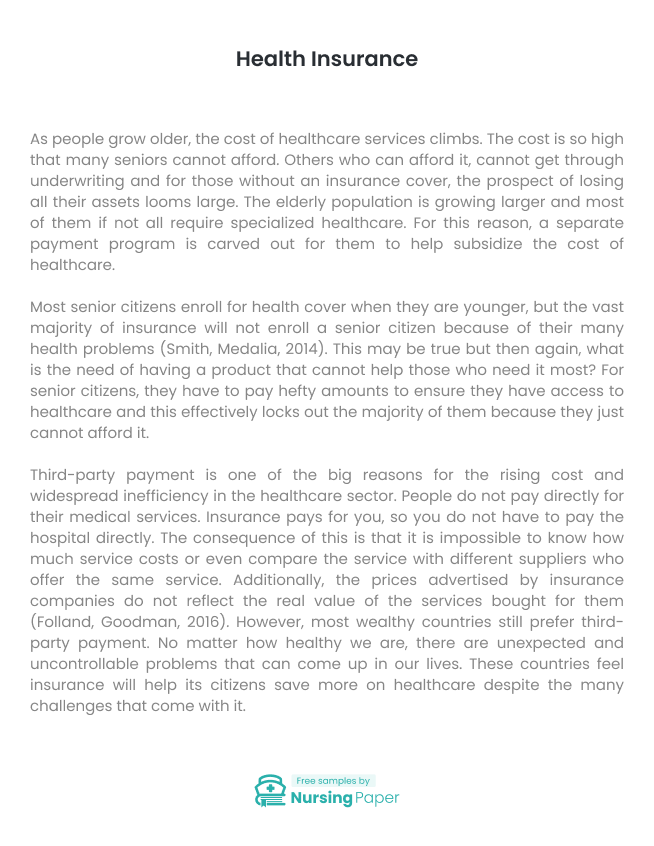
Health Insurance
Introduction
As people grow older, the cost of healthcare services climbs. The cost is so high that many seniors cannot afford. Others who can afford it, cannot get through underwriting and for those without an insurance cover, the prospect of losing all their assets looms large. The elderly population is growing larger and most of them if not all require specialized healthcare. For this reason, a separate payment program is carved out for them to help subsidize the cost of healthcare.
Most senior citizens enroll for health cover when they are younger, but the vast majority of insurance will not enroll a senior citizen because of their many health problems (Smith, Medalia, 2014). This may be true but then again, what is the need of having a product that cannot help those who need it most? For senior citizens, they have to pay hefty amounts to ensure they have access to healthcare and this effectively locks out the majority of them because they just cannot afford it.


Third-party payment is one of the big reasons for the rising cost and widespread inefficiency in the healthcare sector. People do not pay directly for their medical services. Insurance pays for you, so you do not have to pay the hospital directly. The consequence of this is that it is impossible to know how much service costs or even compare the service with different suppliers who offer the same service. Additionally, the prices advertised by insurance companies do not reflect the real value of the services bought for them (Folland, Goodman, 2016). However, most wealthy countries still prefer third-party payment. No matter how healthy we are, there are unexpected and uncontrollable problems that can come up in our lives. These countries feel insurance will help its citizens save more on healthcare despite the many challenges that come with it.
1. Folland, S., Goodman, A. C., & Stano, M. (2016). The Economics of Health and Health Care: Pearson International Edition. Routledge.
2. Smith, J. C., & Medalia, C. (2014). Health insurance coverage in the United States: 2013. Washington, DC: US Department of Commerce, Economics and Statistics Administration, Bureau of the Census.



The download will start shortly.

The download will start shortly.
 Subject:
Health and Social Care
Subject:
Health and Social Care  Number of pages: 5
Number of pages: 5  Subject:
Health and Social Care
Subject:
Health and Social Care  Number of pages: 5
Number of pages: 5  Subject:
Medicine
Subject:
Medicine  Number of pages: 7
Number of pages: 7  Subject:
Medicine
Subject:
Medicine  Number of pages: 5
Number of pages: 5  Subject:
Health and Social Care
Subject:
Health and Social Care  Number of pages: 2
Number of pages: 2  Subject:
Nursing
Subject:
Nursing  Number of pages: 5
Number of pages: 5  Subject:
Medicine
Subject:
Medicine  Number of pages: 6
Number of pages: 6  Subject:
Medicine
Subject:
Medicine  Number of pages: 2
Number of pages: 2  Subject:
Nursing
Subject:
Nursing  Number of pages: 4
Number of pages: 4  Subject:
Health and Social Care
Subject:
Health and Social Care  Number of pages: 5
Number of pages: 5  Subject:
Medicine
Subject:
Medicine  Number of pages: 2
Number of pages: 2  Subject:
Health and Social Care
Subject:
Health and Social Care  Number of pages: 4
Number of pages: 4  Subject:
Nursing
Subject:
Nursing  Number of pages: 4
Number of pages: 4  Subject:
Health and Social Care
Subject:
Health and Social Care  Number of pages: 9
Number of pages: 9  Subject:
Medicine
Subject:
Medicine  Number of pages: 8
Number of pages: 8 
